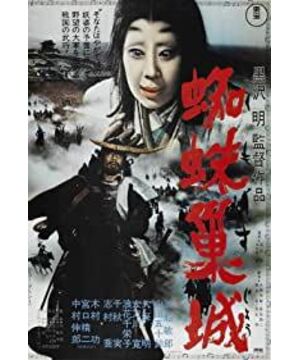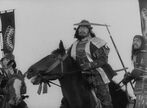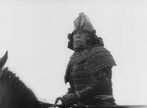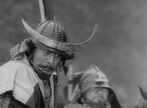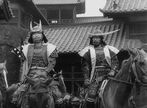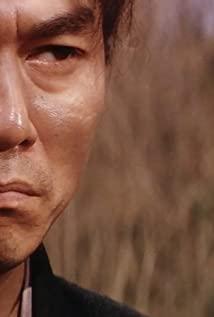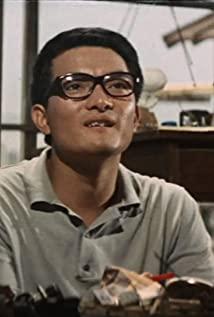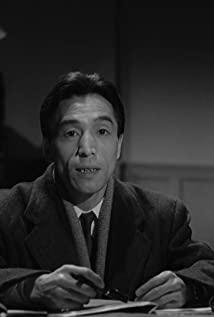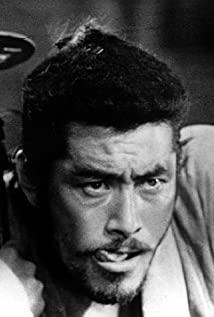Kurosawa Akira’s films "Spider's Nest" and "Chaos" have an irresistible charm. Among all the Shakespeare plays that are on the screen, these two films show a unique and unique Profound meaning. It can be said that this is a very successful re-creation by Akira Kurosawa based on Shakespeare's play. He transplanted the story of medieval Europe into the same chaotic Japanese Warring States period. Despite its form, it firmly grasped the deepest tragic connotation in Shakespeare's play. . The tragedy of human nature, trapped in desire and unable to extricate itself, can be said to be the commonality of human beings. Kurosawa used his deep vision and humanitarian spirit to analyze the evil hidden behind human nature, and this is the charm of Shakespeare. Where. As we all know, the beauty of stage plays comes from the beautiful lines to a large extent, but when it is made into a movie, the lines have become a prison that many adaptors can’t get rid of, because the film first presented us with a visual The world of hearing is followed by the world of hearing. Just as Leonardo said: “The eyes, called the window of the soul, are the main tools of human understanding. They enable everyone to fully appreciate the natural world. Infinite creation; and the ear is secondary, because it is important because it can hear what the eye has seen.” Although the lines of Shakespeare’s play are so graceful, the scriptures are undoubtedly not suitable for the form of the movie. Zeming presents us with another kind of grace, a kind of beauty in which lines are visualized, epic scenes, beautiful pictures, and a combination of movement and static, patchy plots, making the filmed Shakespeare show a unique style. angry.
"Spider's Nest" is adapted from Shakespeare's "Macbeth". This film can almost be regarded as the peak work of Akira Kurosawa in the early stage. The application of deep focus technology allows people to clearly define every detail in the film, the excitement, and the unique sports shots. The film has a rare affinity. The film’s music is dominated by flute, and Japanese "Noh" is widely used. It has national characteristics, balanced structure and spectacular scenes. In contrast, "Chaos" is relatively calm. There are few wiping shots of Akira Kurosawa in the past, which are just simple montage editing, but the gorgeous colors and wonderful music bring a different shock to people. This film Adapted from Shakespeare's play "King Lear", it blends into the story of the three sons of Morimoto in the Warring States Period in Japan, which is profound and thought-provoking. The depiction of human nature in these two films is extremely successful, flashing immortal brilliance.
1. Desire
Desire, the eternal root of human beings, even though tragedies are repeated, there is still no regrets and no regrets in pursuit. Just as Kuang Ami in "Chaos" said, "From ancient times, people have been walking the same way." Burning with the raging fire of desire, I lost myself on the way forward without knowing it. At the beginning of "Spider's Nest", two warriors, Washizu and Miki, who returned to the city to receive the reward, were once lost in the spider-hand forest they were familiar with. In the misty fog, dazzling lightning, and pouring rain, two horses Running back and forth, Kurosawa showed the state of human being lost in his desires vividly. Before and after the film echoed with the singing of the choir, the theme of the film is expressed in a simple and profound way. "The desire of man is like a tragic battlefield, which will never change from ancient times to the present." And in the spider hand forest are Washizu and Miki. The prophesied monster even more vividly stated the evil roots of mankind, "How ugly the world is, it is born in the world, as cheap as an ant, but still alive. Why bother yourself, how stupid. Life is like a flower, come and go in a hurry. Turned into carrion skeletons. For the desire of power, people would not hesitate to burn themselves, and they would not hesitate to jump into the five muddy lakes. Sins were hoarding, and they reached the end of the confusion. The carrion fell on the soil and bloomed, releasing fragrance. The ridiculous people are really ridiculous. "People are so ridiculous, they dare not face their true heart." For the samurai, being the lord of the city is their eternal pursuit, but in reality, they dare not make random times. Their self-deception and loyalty conceal their inner heart. desire. When he walked out of the spider-hand forest, Jiujin recalled the plot of running in the forest and encountering monsters, feeling like a dream. At this time, Miki clearly pointed out, "Dream is the manifestation of desire." Regardless of whether things in the forest are true or illusion, their desires are fully exposed.
The first step to realize desire lies in the establishment of power. This is even better in "Chaos". When the old master Yiwen Xiuhu handed over the power to Taro, it was accompanied by an emotional turnaround between father and son. The farce of fighting for the banner, the coldness of forcing his father to draw, and the absurdity of making the old master’s maid, Sotaro’s maid salute, showed that the newly in power Taro was eager to control everything, and sent soldiers to occupy the third city of Saburo to advance his ambitions. In another step, not only the father and son are ruthless, but the brothers are also unrighteous. Jiro's dissatisfaction with Kyu Taro, his rejection of his sojourn father, and the plan to rebel against Taro pushed this tragedy to a climax.
The conversations of the servants of Jiujin in "Spider's Nest" also reflected the endless desire of human nature from another aspect. The ease when entering the North Hall from No. 1 Village immediately denied the previous life, and when they were in When overlooking the North Pavilion from the tower, the life in the North Pavilion also became insignificant. This is exactly the portrayal of people's endless desires. According to the predictions of the monsters, Jiu Jin first killed the king and usurped the throne, and then he did not want to lose his power. He went after Miki and his son regardless of the prophecies. It was not so much that the predictions of the monsters worked, but rather an adventure driven by desire. Before profit, all warmth was false.
Two, slander,
"Spider's Nest City" and "Ran", there is a woman who encourages and incites men to betray, their words are extremely successful in stimulating the desires in the hearts of men, regardless of the "Spider's Nest City" in the shallow Mao, They are also the Madam Feng in "Ran", they all have obvious personality traits, and they are not afraid to show their feelings. If the wife is the other half of the husband, I prefer to regard Qian Mao and Madam Feng as the externalization of human desires. , They are the other side of the character of Washizu, Taro, and Jiro, that is, their sincerity that they dare not face. Therefore, instead of attributing the crime to these two troubled women, it is better to attribute it to the betrayers themselves.
When the devil uses petty profits to deceive people’s trust, the next evil is human beings, who take the initiative to realize the so-called unchangeable destiny. Washitsu Killing King and Miki Kaicheng are all manifestations of this, slander in desire, It can only be regarded as a catalyst. Let all ethics and shame disappear, and let naked desires dominate life.
There is a kind of slander from the supporters of the rebels, such as the black gold in "Ran", saying that its ugliness and infidelity are not correct, but the beginning of Jiro’s desire was the result of his instigation, killing Taro and replacing it. Marrying his sister-in-law, Mrs. Feng, came largely from Hei Jin's idea, but letting go of Madam Mo and vowing to fight for Jiro to the end, he could see his loyalty. This contradiction also comes from the sorrow of human nature itself, and in the final analysis it is also attributable to desire. The so-called soaring one person, immortal and chicken dog. When the master is promoted, the subordinates also benefit from each other, and this is the case with Jiujin's subordinates in "Spider's Nest".
The sorrow of Mrs. Feng in "Chaos" comes from the desire for hatred, while the Qianmao in "Spider's Nest City" does not hesitate to push her husband to the cusp of evil because of her own selfishness. The poison of slander is evident here. However, if Jiu Jin and the others had no ambitions, all the slander would be useless, and the real sin would still come from their own hearts.
3. Betrayal
The extreme desire is cruel betrayal. Ethics, father-son affection, husband and wife's kindness are completely ignored. The life controlled by power is a bloody struggle. The thick bones in the spider-hand forest are witnesses of these tragedies. The Jiu Jin of "Spider's Nest City", who originally had immortal feats, embarked on a stinking road of no return due to betrayal. Akira Kurosawa extremely profoundly reproduced the whole process of how a hero fell and was assassinated in the North Hall. The section before and after Hou Ye is a classic psychological description. The galloping horses outside the door allude to the confusion in Jiujin’s desire, and this is similar to the two generals running through the spider-hand forest in the previous film. Wonderful, and in the room where the rebel general Tengjuan was killed, solidified blood, ominous crows, rushing drums, as well as the tense movements and flustered eyes of the characters, all showed that a betrayer had a relationship with The struggle of conscience, until the end evil takes the main part.
The best way to express betrayal is the war from within. In "Spider's Nest", the scenes of Jiu Jin murdering Lord Hou, putting on blame, and chasing Young Lord, undoubtedly make the film more cruel, this is Kurosawa Ming performed more extreme in "Ran". When Taro and Jiro joined forces to attack the third city where their father was, the tragic scene set off the betrayal of the two sons very cruel. The yellow and red flags are intertwined, wars are flying, and arrows are falling like rain. Kurosawa used a set of independent montages to show a suffocating scene of violence, bloody corpses, remnants with severed hands, protruding arrows, The old master’s two concubines who lost their lives under each other's blade...In the billowing smoke and dust, the betrayal continued. The end of one betrayal turned out to be the beginning of another betrayal. Gunshots crossed, Taro fell to the ground in response, Jiro The betrayal followed. The whole war lasted for a full 15 minutes. With a word, the tiger went crazy out of the castle, and ended in confusion in the wild grass dancing wind.
Kurosawa presents a heartbreaking picture in a mocking way. Amidst the chaotic cicadas, the influence of a writer disintegrates little by little. Xiuhu in the tower wants to cut his stomach to commit suicide, but can't find a knife. It is cruel. The reality made him have to face this betrayal from the people he was closest to and trusted the most. The sad trumpet, the low drum sound, and the sad string music set off this absurd war so horribly, the sins of man can be so extreme.
There is also another kind of betrayal here, which is a betrayal of one's own conscience. Just as the saying goes, a lie needs thousands of lies to cover up. A betrayal also requires hundreds of acts against conscience to be stabilized. These sad betrayers are not without conscience, but in the confrontation between good and evil, the fragile goodness in their hearts cannot resist fierce crimes. Going farther, I don’t know how to repent. For example, Jirou in "Spider's Nest" killed Miki, in "Ran" Jiro killed his brother, and chased down his wife Ahmad. After every discovery of conscience, there is an even more heinous betrayal, and destruction is inevitable in the frenzied killing.
Fourth,
the destructive consequences of the desire to destroy can only be that the people betray their relatives and move toward self-destruction. They do evil all the way, do not know introspection, and eventually fall into the mud. According to the words of the monsters in "Spider's Nest", it is to go to the end of confusion. When Jiujin rode his horse into the forest again and asked about the results of the battle, the answer he got was that he would be undefeated unless the spiderman forest approached the city. This became the basis for Jiujin to inspire morale, but he did not expect it to be the direct cause of his destruction. Kurosawa has a very clear attitude towards betrayal. As the officials in "Spider's Nest" sang, "There are precedents in ancient times. In this way, Taro, Jiro, Ikoma, and Ogura in "Ran" all go to extinction without exception. The ending of "Spider's Nest City" is spectacular, the death scene is magnificent and tragic. Jiujin, who claims to build another corpse mountain in the spider hand forest, cannot escape the arrangement of fate in the end. Amidst chaotic arrows, he struggles to death, surly. His face shows a kind of self-inflicted despair.
The tragedy of "Ran" is much more complicated than "Spider's Nest". It involves the betrayal of a group of people. The beginning of the film has already set the tone for it. In the motionless picture, four warriors facing different directions, the background is the sky with layers of thunderclouds, the chaotic theme is self-evident, and the text shows that the tiger is naturally cruel, and kills countless in the midst of it. When he was over 70, he came up with a whim, regardless of his opposition to hand over power to his three sons, and prepared to enjoy his old age. Unexpectedly, this behavior became the root of all tragedies. Saburo pointedly pointed out that in troubled times, all sentiments are untrustworthy, but Xiuhu disagrees. In a rage, he exiles Saburo, and personally deals with Taro and Jiro with power and desire, which leads to the fight between his sons, and he is also displaced. At the end of the depression, a literary regime fell apart. Taro Jiro attacked his father, Jiro killed his brother to seize the throne, and even finally Jiro attacked Saburo’s troops and sent people to assassinate Saburo. It can be said that it started with Xiuhu, and eventually a group of people went to mass destruction in desire.
When Kuang Ami knelt and asked the sky, "Killing people don’t blink and make humans cry. Is that so funny?" Samurai Hirayama replied, "Seeing all evil humans killing each other, gods and Buddhas can’t save them. This is the human world, without asking for happiness. Seek sorrow, not peace but pain." This is exactly Kurosawa's attitude. At the end of the film, the lonely Tsurumaru stands under the blood-colored sunset. The killing of human beings is still going on. The Buddha statues falling in the dust are telling the sorrow and powerlessness of the world. The tragedy of human nature may be a destiny that cannot be changed.
View more about Throne of Blood reviews


